|
It has been more than a week since we heard anything further on the very dangerous e-coli outbreak in Europe. This e-coli was a vicious strain that resisted normal antibiotics and killed, at last count, 22 people. European officials were frantically searching for the source of the bacterial infection, pointing fingers first at cucumbers from Spain, then sprouts from a farm in Germany. Neither of those turned out to be true. Interestingly, the story faded quickly, although paranoia about food consumption seems to be still in progress. The BBC reported six days ago that Spanish farmers can't give away their produce, even though noone has been able to prove the E-coli came from Spain.
I have a prediction. European investigators will find that international produce, which is picked early and trucked or flown long distances, will be passing through a common processing plant where they are sprayed clean of dirt, waxed to look good, irradiated to force them to look ripe, and sometimes packaged. The E-Coli will be entering the food system at this site, the processing plant, through a contaminated water system. This processing plant will be located near an animal processing plant, called CAFO (Concentrated Animal Feeding Operations). At these sites, animals are kept in a small space and given antibiotics to stave off the infections that occur from a poor diet, lack of exercise and, most importantly, standing all day, up to their stomachs, in their own poop. The antibiotics come out in the poop, mix with all the other poop and this slurry of poop and its accompanying mix of bacteria, fungi, viruses, etc goes sliding into the nearest stream or pond, or seeps through into the water table, contaminating the water system in the area around the CAFO. Of course bacteria are going to become resistant and are given the opportunity to become resistant since they are swimming around with antibiotics - they learn how to thrive in spite of them. If you listen very closely to what the news reports coming out of Europe you will hear the scientists continuously mention looking at the places where the food was processed. I predict within the month, we will hear that the source of the E-Coli is in the processing, and is due to contaminated water. This is the one of the best arguments for shopping local I can think of! YOU, loyal farmers market people, you don't have to worry about the food you purchase at our market! You see that dirt on the carrots - that is the dirt they grew in. Wash it at home - your tap water does not have E-Coli, does not come from a well near a CAFO! You can rest assured, you will eat well, and safely when you buy at your local farmers market! Purchase your fruits and vegetables at the West End Farmers Market and never worry about pesticides in your food! Our farmers practice sustainable agricultural techniques. They may not be able to afford the USDA "Organic" label, but they farm as close to those standards as possible. Our apples and celery are safe!
The Environmental Working Group (EWG), a nonprofit working to protect public health and the environment, published their 2011 Shoppers Guide to Pesticides in Produce. This year apples and celery top the list of items they recommend people purchase organically to reduce the risk of dangerous intakes of pesticides. The EWG measured the pesticides after powerwashing the produce and peeling it as a normal cook might do. Consider this: a pesticide is a lethal dose of poison meant to kill a living thing. If it kills a bug it may harm you as well. It can be hard to make the leap from spraying for bugs to dangerous to humans - especially since most of us treat our homes for ants and cockroaches. But would you ever spray an insecticide on your hand, rinse your hand with water and then lick your hand? Sounds yucky doesn't it? There would be residue, you would ingest it. Pesticides are made to stay on the fruit even if it rains. They don't wash off with water. Read the EWG article. It is informative and it gives you a list of produce that pesticide use does not affect, like sweet potatoes and onions, as well as a list of fifteen produce items that you should purchase at your farmers market or organic in the store. See you at the market! Do you have a Gmail account? Are you using your Reader?
Google Reader allows you to subscribe to our blog using our RSS feed. You can easily share individual blog posts with others by simply emailing the post to them right from Google Reader! Adding our RSS feed is easy. Here's a step-by-step how-to:
"West End Farmers Market - Blog" should now show up in the left column. When you click on that link, the blog posts should appear on the right and you can read them from there! At the bottom of each post there are several links. The fifth one is "Email." When you click on that, an email message opens up with the entire blog post in the body of your email. From here, you can share it with anyone! Have you heard of the new Google Maps application called Mapnificent? It shows you how far you can go in a given amount of time using public transit. This, for example, is a map of everything within 15 minutes of the West End Farmers Market:
The practice of modern, organic, sustainable farming began in the 1950s in response to large agribusinesses' use of petroleum based or synthetic pesticides and fertilizers which were found to be harmful to humans. The number of farmers practicing organic farming at that time was very, very small until the late 1980s, when customer demand created a growth spurt in organic farms. In 1990, the Federal Government legislated strict standards for achieving an organic certification. Unfortunately, meeting the standards and being certified is quite expensive and time consuming. Many small farmers cannot afford it and in some places, organic has been usurped by large agribusiness.
The advantage of eating local fruits and vegetables over licensed, organic long-distance farmers' produce is that unripe produce is typically gassed, irradiated, or frozen to keep them in stasis until they reach their destination, four to seven days later, and then gassed, irradiated, unfrozen and chemically induced to become or look ripe. Local foods are almost always picked the day before you purchase them when they are at the peak of the ripeness and thus are full of flavor. At the West End Farmers Market the farmers who are closest to organic farming, but who do not have a certificate would be Papa’s Orchard, Maple Avenue Farm (sold at the On the GOurmet Truck) and Shamba Farm (pictured above). All the other produce and fruit vendors attempt sustainable farming techniques by using minimal amounts of fertilizer and pesticide. Please talk to our farmers. They can tell you way more about their farms and love to talk about their business. The West End Farmers Market is sponsoring a canning recipe contest. Bring your recipe to Eden Good or to one of the market managers at the Hospitality Tent. Your recipe will be posted on a board at the market, copied, made available at the market and on our website. In August, there will be a recipe tasting contest and we will be giving away blue ribbons. More information to come... BUT bring your recipes to the market next week!
9:30 a.m. and 11:30 a.m. at the Eden Good Tent
This Sunday, Lucy and Bonita from the Eden Good Team, will demonstrate how easy it is to can fresh vegetables at 9:30 a.m. and 11:30 a.m. As you may already know, the West End Farmers Market was chosen to be one of 50 farmer's markets promoting the canning fresh food. It is a marvelous way to extend the delicious tastes of summer produce all winter long AND save on grocery bills. Coupons for canning equipment and free canning cookbooks will be given away. There is also a raffle to win a canning kit and big hardcover cookbook. Please come and enjoy! Starting in February people in the neighborhood began asking, "When does the farmers market start?" The glittery eyes, the minor note of desperation as they grilled for a date, revealed a customer suffering from fresh food withdrawal.
Why do we like our food fresh? Well to begin with, it tastes better - as a matter of fact it tastes great! Other more intellectual reasons: there are more nutrients when a vegetable or fruit is picked the day before, there are usually far less pesticides and fertilizers used in local, small farming, and local fruits and veggies are not grown from genetically engineered seeds. At the farmers market, a juicy ripe tomato, is a luscious-taste-sensation tomato, not a peanut/corn/tomato hybrid with a thick skin and little juice. The drawback of course is that local fresh food is only available during the growing season. But what if you could extend the growing season, or rather extend the period you could enjoy the abundant fruits of the growing season? In the two hundred years since preserving food in sealed glass jars was invented, people have created stupendously tasty recipes for keeping all manner of fresh fruits and vegetables available through the sparse winter months. This year the National Farmers Market Coalition in partnership with the company that makes Mason Canning jars and tools has chosen The West End Farmers Market and 49 markets throughout the U.S. to help promote canning as a method for people to have access to fresh food through the winter. At the West End Farmers Market we will be having canning demonstrations, giving away coupons and pamphlets, having a raffle for free canning kits, and BEST OF ALL, we are sponsoring a canning recipe contest. Look for more information on this blog and our facebook account. Until then - All you foodies out there - WE WILL SEE YOU AT THE MARKET. Stop by the Eden Good Tent or the West End Farmers Market Hospitality Tent for more information. James Smith offers a variety of fresh fruits and vegetables. His family has been farming for 20 years. They started out with 5 acres and eventually purchased a 39 acre farm in Westmoreland County. A lot of blood, sweat and tears, but they wouldn’t want to do anything but what they are doing. His family loves farming and they are are hoping that their boys will want to take over someday. This year they are planting a lot of early crops: kohlrabi, mixed lettuce, bok choy, herbs, swiss chard and strawberries.Also expect to see kale, collard greens, mustard greens, turnips, okra, and all kinds of lettuces.
|
West End Farmers Market
|
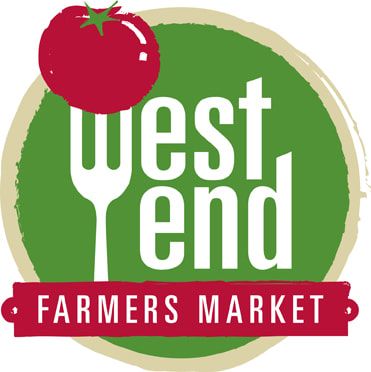
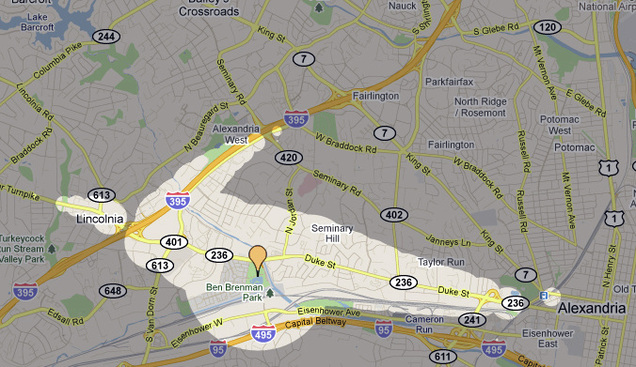
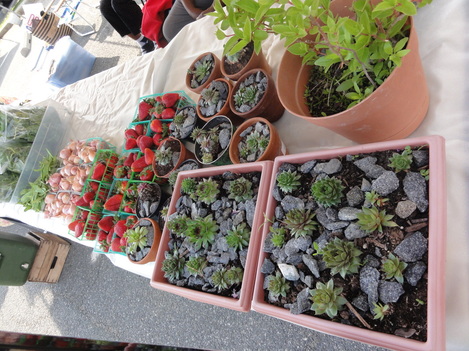
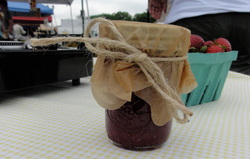
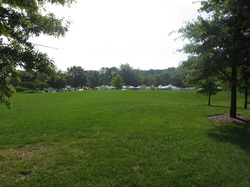
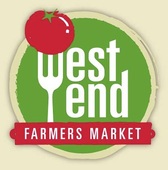
 RSS Feed
RSS Feed
